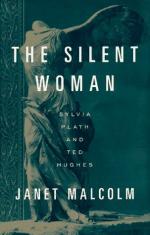|
This section contains 622 words (approx. 2 pages at 400 words per page) |

|
The Silent Woman: Sylvia Plath and Ted Hughes Summary & Study Guide Description
The Silent Woman: Sylvia Plath and Ted Hughes Summary & Study Guide includes comprehensive information and analysis to help you understand the book. This study guide contains the following sections:
This detailed literature summary also contains Topics for Discussion and a Free Quiz on The Silent Woman: Sylvia Plath and Ted Hughes by Janet Malcolm.
The Silent Woman by Janet Malcolm is essentially a review of the biographies that have been written about poet Sylvia Plath. Sylvia's short life and career ended prematurely when the thirty-year-old writer took her own life. Since that tragedy, at least five major biographies have been written as well as several other memoirs of note written by people who knew her on a personal level. When the biographers ventured into Sylvia Plath territory, they were met by Olwyn Hughes, older sister of Ted Hughes, who was married to Sylvia. Olwyn was the literary agent over the works of Plath and it was she who writers would have to contact for permission to include full versions of Sylvia's poetry and other works in their manuscripts. Buy Olwyn played a much bigger role than that. She became the protector of her younger brother Ted and she came at the writers like a pit-bull with fangs bared.
When Sylvia committed suicide, she and Ted had been separated for several months. He had been involved in an adulterous affair with another woman which ultimately destroyed the marriage. But there were many first-hand accounts and anecdotes that indicated that Sylvia was suffering from chronic depression and perhaps even more serious mental and emotional conditions. Dating back to her youth, some who knew Sylvia accused her mother of failing to address her mental problems; in fact, she served to enable them. Some critics believed that Sylvia's unstable mental condition was as much to blame for her suicide as was her husband's infidelity.
After Sylvia died, Ted Hughes was given the majority of the blame for Sylvia's untimely death. Almost from the moment she died, Ted's actions were scrutinized and criticized by those who felt his abandonment of Sylvia was what pushed her over the edge. The majority of the biographies and memoirs placed this blame squarely on his shoulders, disregarding much of the evidence that Sylvia was difficult to live with and impossible to please. When he published "The Journals" by Sylvia posthumously, he introduced her works by indicating that he had omitted some of her writing, destroyed others and lost still others. Ted was accused of everything from cashing in on his dead wife to repressing her artistry. But Hughes mainly stayed in the background and allowed his ferocious sister to deal with the "libber" writers—as she referred to women who felt a man [Ted] was repressing a woman [Sylvia]—and others that they felt were libelous and mean-spirited.
Malcolm focuses much of her attention to Bitter Fame, which was written by Anne Stevenson. Stevenson is the only writer to work on her book in conjunction with Olwyn and, not surprisingly, the only book that places some of the blame for Sylvia's tragedy on Sylvia herself. By the time the book was completed—which took four long years—Stevenson felt that the work wasn't hers and felt reluctant to have it published. She suggested that Olwyn Hughes be given credit for co-writing the book, but the publisher refused. Olwyn got her way—the book was the only book that Ted and Olwyn thought credible, although there were still portions that they disliked.
By interviewing the writers of the biographies and memoirs, Malcolm has provided an interesting backdrop to the work of a biographer, a thankless job that often pleases no one. As she said, a writer of fiction is never taken over the coals for his plot or characters, but most everyone doubts some aspect of non-fiction writing. By digging into the various biographies of Sylvia Plath, Malcolm provides insight into the life and career of a mysterious figure whose real life will forever remain an enigma.
Read more from the Study Guide
|
This section contains 622 words (approx. 2 pages at 400 words per page) |

|



